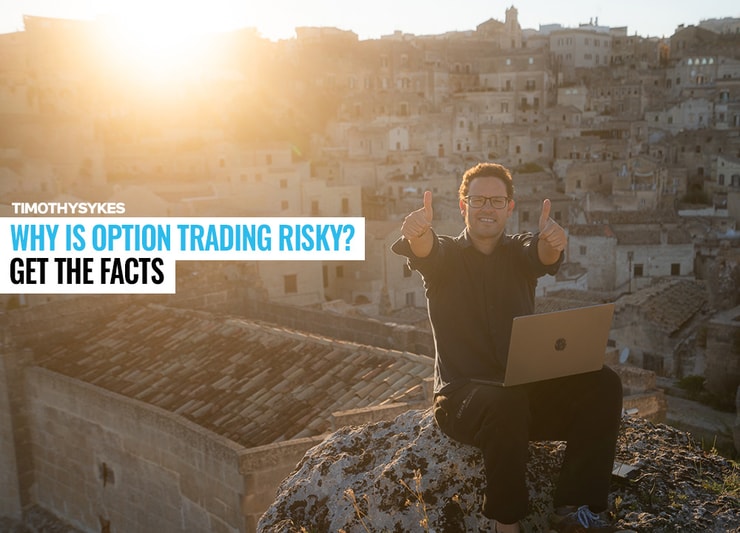Option trading is risky because it’s hard to manage your risk! And risk is the top thing to pay attention to in trading.
When there’s more to learn, there are usually more chances to fail. I’ve seen many options traders blow their accounts up. They lose their initial investments… and sometimes so much more.
In this article, I’ll go over the reasons why options trading is risky. Trading without knowing the risks means you’re trading blindly — a big no-no.
Let’s dive in!
Table of Contents
Why Is Options Trading Risky?

Options trading is risky because it isn’t easy to cut your losses quickly.
What’s my Rule #1?
And never forget rule number one is to CUT LOSSES QUICKLY, do not let small mistakes turn into potential disasters! #disciplinematters #itsaprocess
— Timothy Sykes (@timothysykes) May 4, 2020
Some options trades, like long calls and covered puts, have built-in risk limiters. This means you only risk your premium to get the options contract. Other options trades have much higher potential losses. This usually happens in trades like naked puts.
So, what are the risks of options trading? Here are some of them:
- You can lose your entire investment.
- There’s potential for unlimited losses.
- There’s no direct way to cut your losses quickly.
Higher options trading levels have higher-risk strategies. Check my guide to options trading levels to choose the one that’s right for you.
What Is Hedging in Options Trading?

Hedging in options trading is a way to limit risk when one of your trades fails. This options strategy limits your losses by playing both sides of the chart.
Traders can hedge by trading competing options in competing sectors — for instance, getting options in a renewable energy stock AND an oil and gas stock.
They can also hedge by taking options in the same stock, ensuring they’re covered in the event of multiple outcomes.
Here’s an illustration of how a trader could use options to hedge:
Let’s say you buy 100 shares in XYZ Company for $14 each. You believe prices will rise, but you also buy 1 long-term put contract in the stock with a $10 strike price.
If XYZ Company stock prices rise as you expect, you can let your put option expire, only losing the premium you paid.
If XYZ Company stock prices drop to $6, you can exercise your put and sell your shares at $10 per share. That limits your losses to only $4 per share. Without the put option, you would have lost $8 per share.
Of course, you could limit your risk even more by cutting your losses quickly!
More Breaking News
- Kyndryl Holdings Stock Shows Mixed Performance Amid Market Turbulence
- FMC Plans Debt Reduction and Strategic Growth Initiatives for 2026
- Exponent’s Financial Strength Propels Stock as Dividend Increases
- Novo Nordisk’s Shares Surge as FDA Targets Illegal Drug Marketing
Spread option trading is a common strategy used in options trading. Learn more about spread option trading with my guide.
Why Do Stock Brokerage Houses Encourage Options Trading?
Stock brokerage houses encourage options trading because it’s one more way for them to make money. According to a 2021 Wall Street Journal article, brokers get paid more for options.
Brokers like Robinhood don’t allow short selling. Many traders have used covered put options as a substitute. And in the crazy trading environment of 2020 and 2021, many risky tactics paid off.
The trading culture that emerged online at the same time — in places like Twitter and the Reddit forum WallStreetBets — encouraged the home run swings that options offer. Traders were encouraged to post their losses and “bet” on improbable outcomes.
All of this contributed to the overheated options environment we have today. In 2020, Robinhood traders bought and sold options contracts at 88 times the rate of traders at Schwab, a more traditional broker.
Brokers like this because it’s good for business. I don’t like it — it’s a symptom of overtrading, one of the best ways to blow up your account.
Many internet-based trading platforms offer options trading, but which one is the best? Read my guides on the best options trading platforms and brokers.
Is Options Trading Riskier Than Trading Stocks?

Options trading is as risky as you let it be. The same goes for stock trading.
In 2022, an options-focused study called “Losing is Optional: Retail Option Trading and Earnings Announcement Volatility” was published by MIT and Stanford professors. The authors looked at options trading before 32,791 earnings announcements that took place between Jan. 1, 2010, and Feb. 28, 2021. They found that not only does activity spike before these volatile events, but that traders lost an average of 5–14% on these trades.
In 2002, a stock-focused study called “Trading Is Hazardous to Your Wealth: The Common Stock Investment Performance of Individual Investors” was published by UC Davis professors. It compared stock trading returns to the average market returns for 66,465 households with accounts at a large discount broker during 1991 to 1996, and found an average underperformance of 5.5% on their trades.
All forms of trading are risky. And most traders lose. You have to know that going in.
Build a trading plan that includes risk. Any strategy that has a chance of being successful has to include the possibility of losses. They will happen often.
Do you need to pay taxes on options trading? Read my guide to tax on options trading to find out.
Key Takeaways

Options trading is risky, just like any other trading strategy. There’s always a chance you’ll lose money. What matters is managing risk, not completely avoiding it.
How can you manage risk? You need to build it into your trading plans.
Risk management is just one element of being a self-sufficient trader. Here are more key tips to becoming a smart trader:
- Don’t copy other options trader’s picks. Their risk profile may be different, so what works for them may not work for you.
- Learn options trading strategies from successful traders. Vet your mentors and make sure they provide accurate information.
- Make your own stock watchlists. Research and list the stocks that might make good trades.
- Record every options trade for future review. Improve on your strengths and your weaknesses.
Options trading is one of the hardest things you’ll ever learn. Luckily you can get a head start by learning to trade options from experienced traders.
In the options world, I think there’s no better mentor than my former student Mark Croock.
Mark has racked up $4 million in career earnings, mostly from trading options. He’s done this by adapting my penny stock trading strategies to options. He’s excellent with risk — he routinely trades options whose value has fallen below his risk, instead of holding them to the end like many options newbies.
Now he’s got his own mentorship program, called the Evolved Trader. Check it out for strategy sessions, trade alerts, a great chat room, and more!
How do you manage your risk in options trading? Let me know in the comments!


Leave a reply